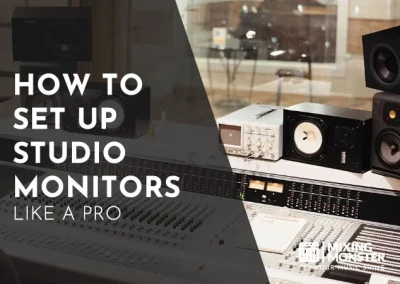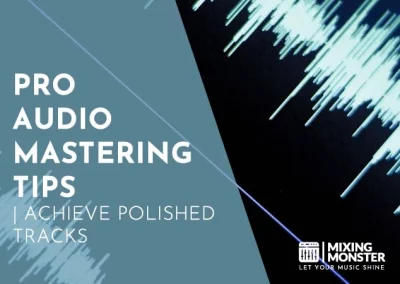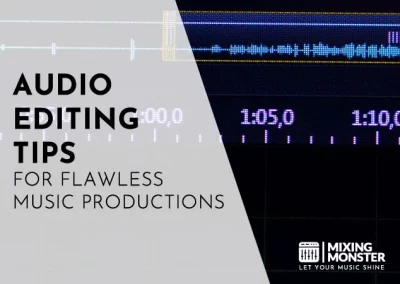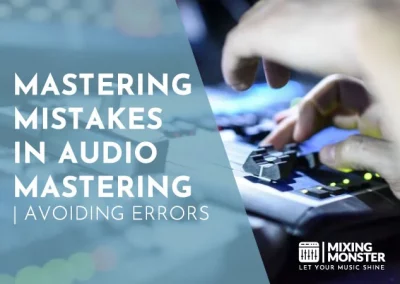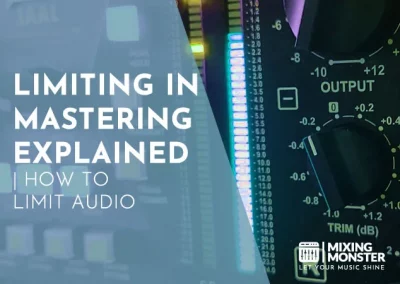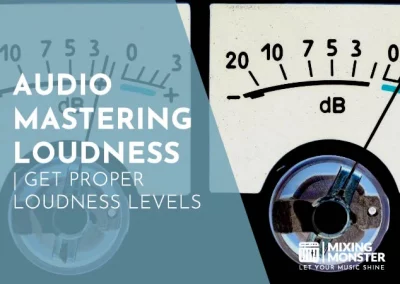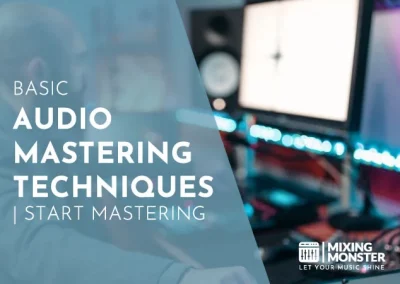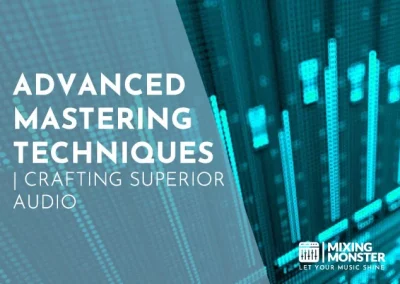Disclosure: Some of the links below are affiliate links, meaning that at no additional cost to you, we will receive a commission if you click through and make a purchase. Read our full affiliate disclosure here.
Listening isn’t just about hearing; it’s an art, especially when it involves critical listening in the context of audio engineering and music production. Critical listening in this domain is the practice of meticulously analyzing sounds to make informed decisions in creating and refining audio content.
Critical listening is an essential skill in audio engineering that involves the analytical assessment of sound. It requires the listener to evaluate audio content with an objective and discerning ear, focusing on pitch, rhythm, timbre, and spatial placement. Audio engineers employ critical listening to identify and rectify issues in a recording, ensuring that the final product meets the desired quality standards.
This article will explore the importance of critical listening for audio professionals, the tools and techniques used to enhance these skills, and the role critical listening plays in audio mastering. By the end of this article, you will better understand how to develop your critical listening abilities to produce high-quality audio.
KEY TAKEAWAYS:
- Critical listening in audio production involves a detailed analysis of sound quality and balance.
- Audio professionals use critical listening to identify and correct issues in a mix or master.
- Combining high-quality equipment and training is essential for developing critical listening skills.
- Mastering requires a high level of critical listening to ensure the final product is polished and cohesive.
Table Of Contents
1. The Fundamentals Of Critical Listening In Audio Engineering
2. Tools And Technologies For Enhancing Critical Listening
3. Techniques To Develop Critical Listening Skills
4. The Role Of Critical Listening In Audio Mastering
5. Advancing Your Aural Skills With Professional Training
6. Summarizing The Value Of Critical Listening In Audio
7. Mastering Critical Listening In Audio Engineering
8. FAQ

1. The Fundamentals Of Critical Listening In Audio
Critical listening is a skill that goes beyond simply hearing sounds; it’s about actively analyzing and assessing audio content for its value, intent, and efficiency. This is crucial in fields where sound is paramount, such as audio production and music mastering.
Understanding Critical Listening In Audio Production
Your critical listening capacity in audio production directly influences the final product’s quality. As you listen critically, you examine the sound for its clarity, balance, and fidelity.
Here, you’re tasked with identifying discrepancies, such as noise, distortion, or unwanted resonances, and deciding how to enhance these elements. Key questions include whether the sound accurately represents the intended message or meets industry standards.
The Importance Of Aural Skills In Music And Audio Mastering
When it comes to music and audio mastering, critical listening becomes indispensable. It requires an acute understanding of the nuances in music—the pitch, rhythm, and dynamics—and how they contribute to the overall sonic experience.
In this context, evaluating a track’s aesthetic and technical aspects helps you make informed decisions to ensure the piece holds its value for the listener.
Your aural skills enable you to discern critical elements that could elevate or detract from the music, guiding your decision-making process to achieve the optimal master.
2. Tools And Technologies For Enhancing Critical Listening
Critical listening is not merely a skill but an essential tool in audio work. It demands a blend of technology, training, and keen awareness to dissect and evaluate audio content effectively.
Defining Critical Listening In The Context Of Audio Work
Critical listening in audio work is about discernment. It requires you to apply logic and assess the evidence to make informed judgments regarding the quality and fidelity of sound. It goes beyond just hearing the audio; it involves analyzing the text and subtext, understanding the intended perspective, and evaluating the technical aspects.
To thrive in critical listening, you leverage technologies like high-fidelity headphones or monitors that provide an accurate, uncolored representation of sound. Audio analysis tools can give visual feedback on frequency balance and phase issues that might not be obvious upon first listening.
Core Aural Skills For Audio Professionals
Your aural skills must be sharp to excel in audio professions. Here’s a brief overview:
- Frequency Discrimination:
Recognizing and understanding the influence of different frequency ranges. - Dynamics Assessment:
Judging levels and impacts of volume variations. - Spatial Awareness:
Identifying and critiquing the use of stereo or surround sound fields. - Timbral Analysis:
Analyzing individual voices or instruments’ sound quality or ‘color.’
Refine these skills through critically listening to a wide variety of high-quality recordings and actively seeking feedback from experienced peers to gain more nuanced judgments.
3. Techniques To Develop Critical Listening Skills
Critical listening skills enhance your ability to analyze and evaluate audio content effectively. In this section, you’ll learn about the essential equipment to capture every sound nuance and the role of specialized software in refining your critical listening abilities.
Essential Equipment For Optimal Audio Analysis
Your audio setup is crucial to engaging in critical listening. Begin with high-quality headphones or studio monitors that provide accurate sound reproduction. Look for equipment with a flat frequency response to ensure you hear the audio as intended, free from coloration or enhancement.
For instance, verify that your headphones don’t boost bass frequencies, which might lead to incorrect assessments of the audio mix.
An audio interface can also be essential. It converts the digital audio to an analog signal for your speakers or headphones with higher fidelity than your computer’s built-in sound card. A high-quality digital-to-analog converter (DAC) interface ensures you hear every audio detail without added noise or distortion.
Software And Plugins To Aid In Critical Listening
Diverse software tools can support critical listening skills, helping you dissect and analyze audio more deeply. Spectrum analyzers and waveform viewers provide visual representations of the audio, allowing you to spot frequencies or time-based elements that could be problematic. These tools can help identify where an audio signal may be clipping or if there is an imbalance in the stereo field.
Reference plugins allow you to compare your audio with professionally mastered tracks. This comparison can help you understand how your work stacks up against industry standards and identify improvement areas.
When using these tools, remain aware of the possibility of bias affecting your judgment. Ensure you’re not making assumptions about audio quality based solely on visual aids. Always trust your ears and use software as a supplement to, not a replacement for, critical listening.
Remember that a good listener consistently tests the reasons behind the sound variations and does not let preconceptions cloud their analysis. Use examples from the software to back your assessments, and remember that it’s common for plugins to have their own ‘sound,’ which may influence your perception.
4. The Role Of Critical Listening In Audio Mastering
Mastering is the final touch in music production, where your critical listening skills are essential for evaluating the audio quality. Mastering involves finely tuned adjustments to enhance the overall sound of a track.
Effective critical listening in this stage influences the relationship between different elements of the mix and ensures that the message of the music is conveyed truthfully.
Practical Exercises To Sharpen Your Aural Perception
- Focused Listening:
Choose a professionally mastered track. Listen to it repeatedly, focusing on different elements such as the low-end, mid-range, and high-end frequencies. - Comparison Analysis:
Regularly compare your work against reference tracks within the same genre and note the differences in tonal balance and dynamic range. - Frequency Training:
Use software tools to train your ears to identify specific frequency ranges, which can help make precise EQ adjustments. - Critical Analysis:
Analyze your emotional response to track changes with slight alterations in mixing elements. This can help you maintain objectivity in your evaluations.
Tips For Maintaining Objective Listening During Sessions
- Take Regular Breaks:
Ear fatigue can compromise your evaluation, making it essential to rest your ears regularly. - Volume Levels:
Consistently monitor at moderate levels to prevent hearing damage and maintain a neutral perspective on the audio’s dynamic range. - Note-taking:
Keep detailed notes about your initial impressions and changes made throughout the mastering session to track your critical thinking progress. - Environment:
Ensure your listening environment is acoustically treated for accurate sound reproduction, impacting your ability to discern true sound character.

5. Advancing Your Aural Skills With Professional Training
To enhance your aural skills, professional training offers structured approaches to overcoming common hurdles such as listener fatigue and bias while providing practical strategies for maintaining focus and objectivity throughout the listening process.
Overcoming Listener Fatigue And Bias
Listener fatigue can diminish your ability to receive and accurately perceive auditory information. Professional coaching advises scheduled breaks during listening sessions to combat this, ensuring your perception remains sharp.
Another critical aspect of professional training targets bias; it entails recognizing your preconceptions and actively setting them aside to validate the information based solely on its merit.
Strategies For Staying Focused And Objective
Staying focused during the listening process calls for clear and attainable goals. Professional training might include exercises designed to enhance concentration and minimize distractions.
Furthermore, by fostering a role as an objective team member, you’re encouraged to evaluate information without personal bias, focusing instead on the definition and validity of the content.
These strategies will refine your critical listening capabilities, transforming your interactions in interpersonal and educational environments.
6. Summarizing The Value Of Critical Listening In Audio
Critical listening is a multifaceted skill that can significantly enhance your ability to decode and perceive the true message in audio content. It’s more than just hearing; it requires engaging with the content, understanding it deeply, and evaluating its worth.
Certifications And Programs For Audio Professionals
Numerous certifications and programs are available if you’re an audio professional looking to validate your critical listening capabilities. Earning a certification serves as evidence of your expertise and dedication to the field, and it equips you with:
- Technical skills necessary for sound analysis
- Enhanced ability to exercise caution when interpreting audio signals
- Distractions:
The training helps you filter out irrelevant noises, focusing on the relevant audio cues. - Self-Discipline:
As you progress through certification, it enforces a higher level of self-discipline, which is crucial in any professional setting.
7. Mastering Critical Listening In Audio Engineering
In conclusion, critical listening is the cornerstone of audio engineering, a skill that transforms good sound into great audio experiences. The discerning ear of the audio engineer shapes the sonic landscape, turning raw recordings into polished works of auditory art.
By mastering critical listening, engineers ensure the technical excellence of their productions and preserve the emotional intent behind the music, delivering a final product that resonates with listeners and fulfills the artists’ creative vision.
As technology evolves and the audio industry advances, critical listening remains an indispensable tool in the audio engineer’s repertoire, essential for achieving sonic perfection.
Happy listening!
8. FAQ
1) What is critical listening in audio engineering?
Critical listening in audio engineering refers to the focused and analytical way of hearing where the engineer listens for specific elements in a recording to evaluate its quality. It involves an in-depth assessment of various components such as balance, panning, dynamics, and effects to ensure the audio meets professional standards.
2) Why is critical listening important in audio engineering?
Critical listening is vital because it allows audio engineers to detect and correct problems that may not be evident to the casual listener. It ensures the final output is error-free and delivers the intended emotional impact. With critical listening, subtle issues in a mix could improve the listening experience and the quality of the production.
3) How can one develop critical listening skills?
Developing critical listening skills involves regular practice and exposure to a wide variety of music and sound. Training your ear to identify the nuances in different audio elements is essential. It’s also beneficial to analyze well-mixed tracks, use reference tracks, and practice with exercises designed to improve auditory discernment.
4) What tools are necessary for critical listening?
While critical listening primarily relies on the engineer’s ears, having high-quality studio monitors or headphones can make a significant difference. Acoustic treatment of the listening environment is also crucial to prevent sound coloration. Additionally, audio analysis tools like spectrum analyzers can help visualize aspects that may be difficult to hear.
5) Can critical listening be applied to live sound engineering?
Critical listening is just as important in live sound engineering as it is in studio settings. Live engineers must quickly identify and address issues such as feedback, room acoustics, and monitor mixes to ensure the best live audio experience for both performers and the audience.
6) How does critical listening impact the mastering process?
In mastering, critical listening is the final check before a track is distributed. It’s used to achieve a consistent sound across an album and to ensure that the track sounds good on a wide range of playback systems. Mastering engineers rely on critical listening to apply subtle enhancements and adjustments to make a track feel more cohesive and polished.



